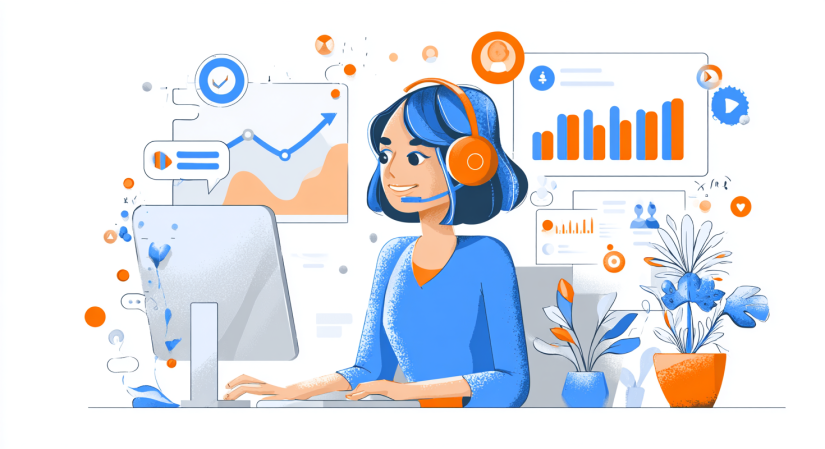In the modern business climate, staying ahead of the competition often means embracing innovative technologies that enhance customer engagement and streamline internal processes. One such revolutionary tool is ChatGPT, a cutting-edge generative AI model developed by OpenAI.
ChatGPT is not just any AI; it is a generative AI that can simulate human-like conversation, answer questions, and even assist in problem-solving. But how can businesses harness the power of ChatGPT-like capabilities, or is ChatGPT Generative AI, and how can we integrate them into their enterprise solutions?
Let's explore.
Revolutionize enterprise communication with Convin.
Emerging Capabilities of ChatGPT
Certainly! Top ChatGPT Prompts, as a generative AI model, possesses emergent capabilities that have evolved through its training on vast amounts of text data. These capabilities enable it to perform various natural language understanding and generation tasks.
Here are some critical emergent capabilities of ChatGPT:
- Conversational Fluency: ChatGPT exhibits a remarkable ability to engage in fluent and contextually relevant conversations. It can understand the nuances of language, including slang, colloquialisms, and cultural references, allowing it to communicate effectively with users.
- Contextual Understanding: ChatGPT can grasp the context of a conversation and generate contextually appropriate responses. It can remember previous interactions in the same discussion, enabling more coherent and meaningful exchanges.
- Information Retrieval: ChatGPT can access and retrieve information from its vast knowledge base to provide accurate and relevant responses to user queries. This allows it to act as a virtual assistant, offering assistance on various topics.
- Problem-Solving Skills: ChatGPT can analyze complex problems and generate solutions or suggestions based on the information provided. It can help users troubleshoot technical issues, brainstorm ideas, or provide guidance on various tasks.
- Adaptability: ChatGPT can learn from user interactions and feedback to improve its performance. Through continuous training and exposure to new data, it can expand its knowledge and capabilities, becoming more effective in various domains.
- Personalization: ChatGPT can tailor its responses to individual users based on their preferences, history of interactions, and specific requirements. This personalization enhances the user experience and fosters a rapport between the user and the AI.
- Multi-Turn Dialogue: ChatGPT can engage in multi-turn dialogues, sustaining conversations across multiple exchanges. This enables more complex interactions and facilitates more profound engagement with users.
- Emotional Intelligence: While not possessing genuine emotions, ChatGPT can recognize and respond to emotional cues expressed in text. It can adjust its tone and language to match the emotional context of the conversation, enhancing its empathy and rapport-building abilities.
These emergent capabilities make ChatGPT a versatile and powerful tool for various applications, including customer service, content generation, virtual assistance, education, and more.
As ChatGPT call centers continue to evolve and improve through advancements in AI research and ongoing training, their capabilities are expected to become even more sophisticated, enabling new possibilities for human-computer interaction and collaboration.

What are the Challenges of ChatGPT in Enterprise?
While ChatGPT offers numerous benefits for enterprise applications, its integration also presents several challenges that businesses must address:
- Data Security and Privacy: Enterprises must ensure that sensitive information shared during interactions with ChatGPT remains secure and compliant with data privacy regulations such as GDPR or CCPA. This includes implementing robust encryption protocols, access controls, and data anonymization techniques to protect user data.
- Bias and Fairness: ChatGPT, like other AI models, may inadvertently perpetuate biases in the training data. Enterprises must proactively identify and mitigate biases to ensure fair and equitable interactions with users from diverse backgrounds. This requires ongoing monitoring, bias detection tools, and implementing bias mitigation strategies.
- Quality Assurance: Maintaining the quality and accuracy of responses generated by ChatGPT is crucial for ensuring a positive user experience. To identify and correct errors or inaccuracies in AI-generated content, enterprises must establish robust quality assurance processes, including human oversight, feedback mechanisms, and continuous monitoring.
- Integration with Existing Systems: Integrating ChatGPT into existing enterprise systems and workflows can be challenging. Businesses must ensure compatibility with legacy systems, data sources, and communication channels while minimizing disruption to existing processes. This may require custom development, API integrations, and collaboration across different departments or teams.
- Scalability and Performance: As the volume of interactions with ChatGPT grows, enterprises need to ensure that the system can scale to meet increasing demand without compromising performance or responsiveness. This requires robust infrastructure, load balancing mechanisms, and optimization techniques to handle peak usage periods and fluctuations in workload.
- Ethical Use and Transparency: Enterprises must adhere to ethical guidelines and principles when deploying ChatGPT in customer-facing applications. This includes transparency about the use of AI, clear communication of AI's capabilities and limitations to users, and the establishment of ethical guidelines for AI-driven interactions.
- User Acceptance and Trust: Building trust and acceptance among users is essential for successfully adopting ChatGPT in enterprise settings. Businesses need to educate users about the benefits of AI-driven interactions, address concerns about privacy and security, and provide channels for feedback and support to build confidence in the technology.
- Regulatory Compliance: Enterprises operating in regulated industries such as finance, healthcare, or telecommunications must ensure compliance with industry-specific regulations and standards when deploying ChatGPT. This may involve additional regulatory scrutiny, compliance audits, and adherence to industry best practices to mitigate legal and regulatory risks.
Addressing these challenges requires a strategic approach, stakeholder collaboration, and ongoing investment in technology, training, and governance processes.
By proactively addressing these challenges, businesses can unlock the full potential of ChatGPT and leverage its capabilities to drive innovation, improve customer experiences, and gain a competitive edge in the marketplace.

This blog is just the start.
Unlock the power of Convin’s AI with a live demo.

Enterprise Use of Generative AI
Generative AI, such as ChatGPT, holds significant potential for various enterprise applications. Here's an explanation of how generative AI can be utilized in enterprises:
1. Customer Service and Support: Generative AI can enhance customer service and support operations. AI-powered chatbots, powered by generative models like ChatGPT, can handle customer inquiries, provide information, troubleshoot issues, and even initiate transactions.
This not only improves the efficiency of customer service but also enables 24/7 support availability.
2. Virtual Assistants: Generative AI can serve as virtual assistants for employees, helping them with tasks such as scheduling meetings, managing calendars, answering common questions, and providing access to relevant information.
These virtual assistants can streamline workflow processes, boost productivity, and free up employees to focus on more strategic tasks.
3. Content Generation: Generative AI can assist in content generation across various domains, including marketing, advertising, and content creation. It can generate personalized product recommendations, craft engaging marketing copy, and even generate articles or blog posts based on specific topics or keywords.
This helps businesses scale their content production efforts and deliver targeted messaging to their audience.
4. Language Translation and Localization: Generative AI models can facilitate language translation and localization efforts for multinational enterprises. They can accurately translate text between multiple languages, adapt content to local cultural norms and preferences, and ensure consistent messaging across different markets.
This enables businesses to expand their global reach and effectively engage with diverse audiences.
5. Data Analysis and Insights: Generative AI can analyze large datasets and generate insights for business decisions. By processing structured and unstructured data, AI models can identify patterns, trends, and correlations, providing valuable insights into customer behavior, market dynamics, and competitive landscapes.
This data-driven approach enables businesses to make informed decisions and drive strategic initiatives.
6. Product Innovation and Design: Generative AI can aid product innovation and design processes by generating ideas, concepts, and prototypes based on user requirements and preferences. It can assist brainstorming sessions, create design mockups, and even simulate user interactions to evaluate product usability and functionality.
This accelerates the product development cycle and fosters innovation within the organization.
7. Risk Management and Compliance: Generative AI can help businesses mitigate risks and ensure compliance with regulatory requirements. AI models can identify emerging risks, predict outcomes, and recommend risk mitigation strategies by analyzing historical data and simulating potential scenarios.
This proactive approach to risk management enables businesses to minimize potential liabilities and maintain regulatory compliance.
8. Training and Education: Generative AI can support training and education initiatives within the enterprise by generating interactive learning materials, quizzes, and simulations. It can simulate real-world scenarios, provide personalized feedback, and adapt content based on the learner's progress and performance.
This enhances training programs' effectiveness and promotes continuous employee learning and development.
Generative AI offers various applications across various enterprise functions, from customer service and content generation to data analysis and risk management.
By leveraging the capabilities of generative AI models like ChatGPT, businesses can drive innovation, improve operational efficiency, and deliver enhanced experiences for customers and employees alike.
Using Conversational AI to Drive Business Success
In the age of digitization, businesses constantly seek innovative solutions to enhance customer experiences, streamline operations, and drive growth. Generative AI, exemplified by models like ChatGPT, presents a transformative opportunity for enterprises to harness the power of natural language processing and automation.
As discussed throughout this blog, integrating ChatGPT-like capabilities into the enterprise offers many benefits, from improving customer service and support to driving innovation and enhancing productivity across various functions.
Through Convin's intuitive platform, businesses can easily integrate ChatGPT-powered real-time assistance and seamless agent coaching into their existing systems and workflows. Convin's advanced analytics and reporting capabilities provide valuable insights into user interactions, enabling businesses to optimize and refine their AI-driven initiatives continuously.
Moreover, Convin's robust security features and compliance mechanisms ensure that sensitive data remains protected and regulatory requirements are met.
By partnering with Convin, businesses can unlock the full potential of generative AI and leverage its emergent capabilities to drive innovation, improve efficiency, and deliver exceptional experiences for customers and employees alike. With Convin, the future of enterprise communication is not just promising—it's conversational.
As businesses embrace the transformative power of conversational AI, they are poised to unlock new opportunities, drive operational excellence, and achieve sustainable growth in an increasingly competitive market landscape.
The journey towards realizing the full potential of ChatGPT-like capabilities in the enterprise begins with the right technology partner—and with Convin, that journey is both seamless and rewarding.
However, realizing the full potential of generative AI in the enterprise requires a strategic approach and the right technology partner. This is where conversational AI platforms, such as Convin, play a pivotal role.
Convin offers businesses a comprehensive suite of tools and services to effectively deploy and manage ChatGPT-powered solutions within their organizations. Want to see it in action? Schedule a demo with Convin today to experience how ChatGPT-like capabilities can revolutionize your enterprise communication strategy.
FAQs
1. How can ChatGPT be used in businesses?
ChatGPT can be utilized in businesses to automate customer support, streamline internal communication, generate content, and assist in decision-making processes.
2. What can you do with ChatGPT Enterprise?
With ChatGPT enterprise, businesses can deploy virtual assistants, improve customer service, generate personalized content, automate repetitive tasks, and gain valuable insights from data analysis.
3. How will companies use ChatGPT?
Companies will use ChatGPT to enhance customer experiences, optimize operational efficiency, drive innovation, and gain a competitive edge in their respective industries.
4. How is ChatGPT being used in the workplace?
ChatGPT is used in the workplace to automate tasks, support employees with information retrieval, facilitate internal communication, and assist in decision-making processes.








.avif)